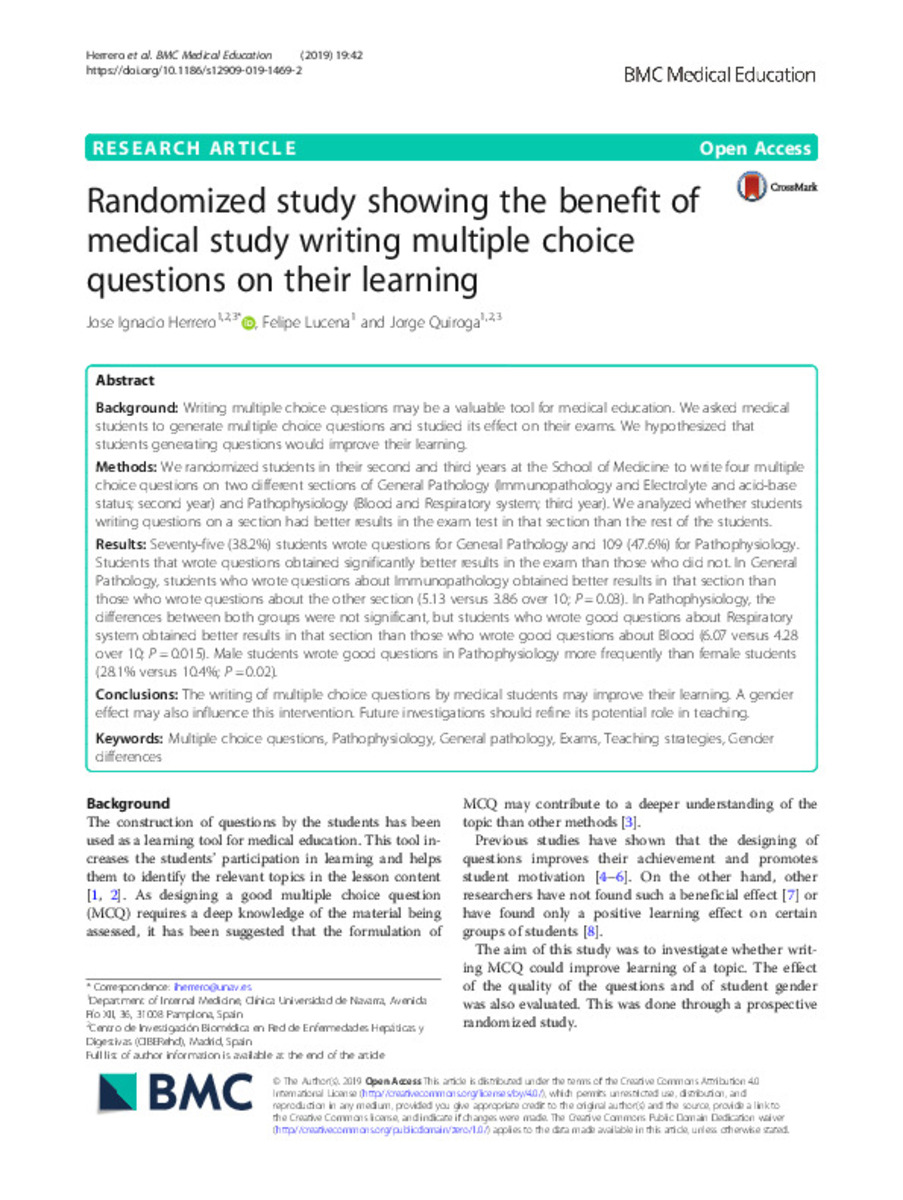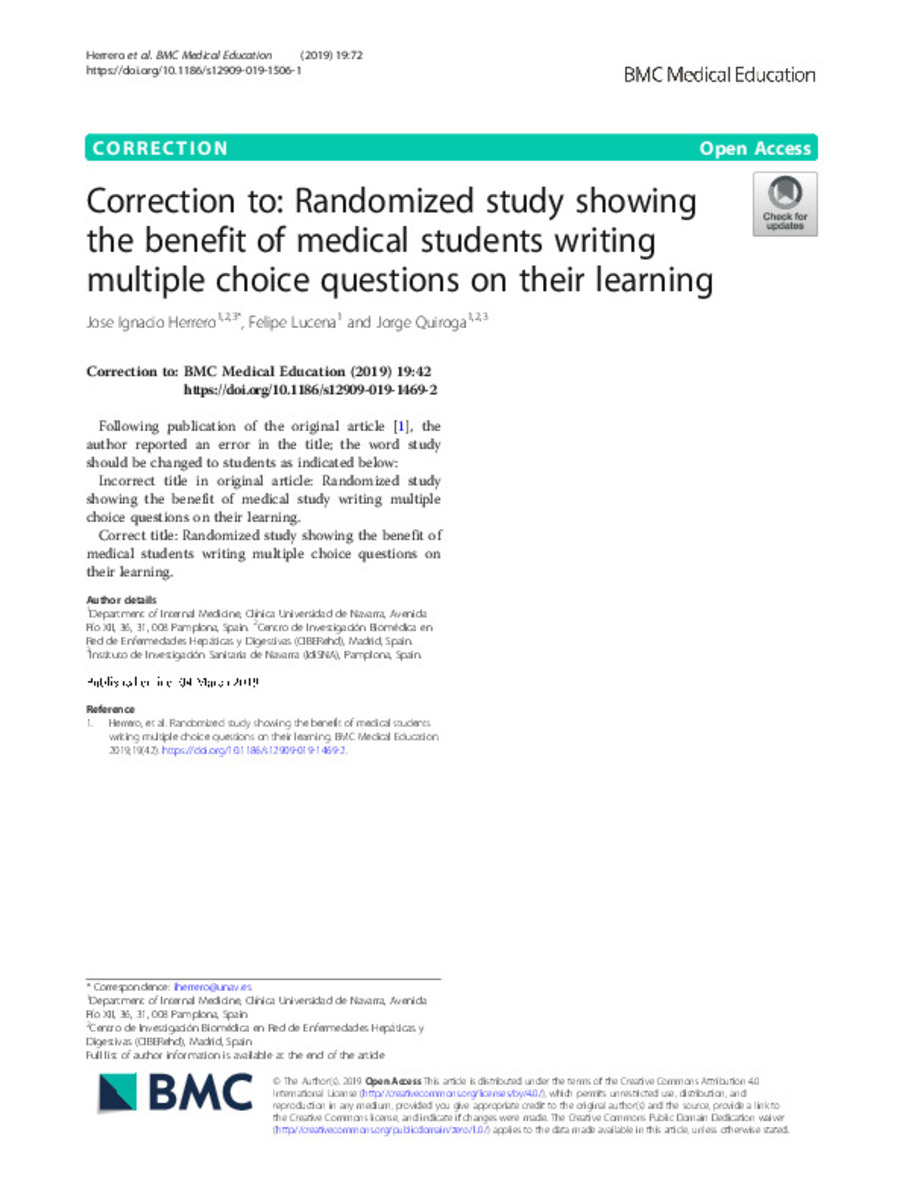Full metadata record
| DC Field | Value | Language |
|---|---|---|
| dc.creator | Herrero, J.I. (José Ignacio) | - |
| dc.creator | Lucena-Ramírez, J.F. (Juan Felipe) | - |
| dc.creator | Quiroga, J. (Jorge) | - |
| dc.date.accessioned | 2021-11-25T13:28:54Z | - |
| dc.date.available | 2021-11-25T13:28:54Z | - |
| dc.date.issued | 2019 | - |
| dc.identifier.citation | Herrero, J.I. (José Ignacio); Lucena, F. (Felipe); Quiroga, J. (Jorge). "Randomized study showing the benefit of medical students writing multiple choice questions on their learning". BMC Medical Education. (19), 2019, 42 | es |
| dc.identifier.issn | 1472-6920 | - |
| dc.identifier.uri | https://hdl.handle.net/10171/62614 | - |
| dc.description.abstract | Background: Writing multiple choice questions may be a valuable tool for medical education. We asked medical students to generate multiple choice questions and studied its effect on their exams. We hypothesized that students generating questions would improve their learning. Methods: We randomized students in their second and third years at the School of Medicine to write four multiple choice questions on two different sections of General Pathology (Immunopathology and Electrolyte and acid-base status; second year) and Pathophysiology (Blood and Respiratory system; third year). We analyzed whether students writing questions on a section had better results in the exam test in that section than the rest of the students. Results: Seventy-five (38.2%) students wrote questions for General Pathology and 109 (47.6%) for Pathophysiology. Students that wrote questions obtained significantly better results in the exam than those who did not. In General Pathology, students who wrote questions about Immunopathology obtained better results in that section than those who wrote questions about the other section (5.13 versus 3.86 over 10; P= 0.03). In Pathophysiology, the differences between both groups were not significant, but students who wrote good questions about Respiratory system obtained better results in that section than those who wrote good questions about Blood (6.07 versus 4.28 over 10; P= 0.015). Male students wrote good questions in Pathophysiology more frequently than female students (28.1% versus 10.4%; P= 0.02). Conclusions: The writing of multiple choice questions by medical students may improve their learning. A gender effect may also influence this intervention. Future investigations should refine its potential role in teaching. | es_ES |
| dc.language.iso | eng | es_ES |
| dc.publisher | Springer | es_ES |
| dc.rights | info:eu-repo/semantics/openAccess | es_ES |
| dc.subject | Materias Investigacion::Ciencias de la Salud | es_ES |
| dc.subject | Multiple choice questions | es_ES |
| dc.subject | Pathophysiology | es_ES |
| dc.subject | General pathology | es_ES |
| dc.subject | Exams | es_ES |
| dc.subject | Teaching strategies | es_ES |
| dc.subject | Gender differences | es_ES |
| dc.title | Randomized study showing the benefit of medical students writing multiple choice questions on their learning | es_ES |
| dc.type | info:eu-repo/semantics/article | es_ES |
| dc.description.note | This article is distributed under the terms of the Creative Commons Attribution 4.0 International License.Following publication of the original article, the author reported an error in the title; the word study should be changed to students as indicated below: Incorrect title in original article: Randomized study showing the benefit of medical study writing multiple choice questions on their learning. Correct title: Randomized study showing the benefit of medical students writing multiple choice questions on their learning. | es_ES |
| dc.identifier.doi | 10.1186/s12909-019-1469-2 | - |
| dadun.citation.number | 19 | es_ES |
| dadun.citation.publicationName | BMC Medical Education | es_ES |
| dadun.citation.startingPage | 42 | es_ES |
Statistics and impact
Items in Dadun are protected by copyright, with all rights reserved, unless otherwise indicated.







